 In this beautifully-told coming-of-age story, Cerinthe Gale stands at a crossroads in her life. She’s traveled from her far-off home of the isle of Normost to the royal island of Faranor, where she will audition to join the royal school of dancing. She knows she’s good, and it’s a dream of hers to one day be an accomplished dancer. But is she good enough to win a place at the school? Cerinthe lets nothing stand in her way, not even discouragement and disappointment. But when she actually gets into the school, her life is turned upside-down. Now she has to choose between a life of dancing, and her calling as a healer. Haunted by memories of her lost mother, tormented by a bitter rival, and deserted by the Goddess she worships, Cerinthe must find her true path, before it’s too late to choose.
In this beautifully-told coming-of-age story, Cerinthe Gale stands at a crossroads in her life. She’s traveled from her far-off home of the isle of Normost to the royal island of Faranor, where she will audition to join the royal school of dancing. She knows she’s good, and it’s a dream of hers to one day be an accomplished dancer. But is she good enough to win a place at the school? Cerinthe lets nothing stand in her way, not even discouragement and disappointment. But when she actually gets into the school, her life is turned upside-down. Now she has to choose between a life of dancing, and her calling as a healer. Haunted by memories of her lost mother, tormented by a bitter rival, and deserted by the Goddess she worships, Cerinthe must find her true path, before it’s too late to choose.
At first I was willing to dismiss this book as melodramatic, but the unevenness of the first few pages rapidly gave way to a satisfying and relatively unpredictable storyline. For every plot twist I was able to predict, there was at least one that surprised me. Cerinthe is a character worth sympathizing with, who’s willing to work for her dreams, and overcome initial obstacles. The dancing scenes sparkle with authenticity, and the atmosphere of the setting positively comes alive under Calhoun’s evocative touch. My only complaint is that the story was over too soon; there were several storylines that deserved more time and attention, and a sequel certainly wouldn’t be out of order. Chalk Aria of the Sea up as a pleasant surprise, and a book to look for.
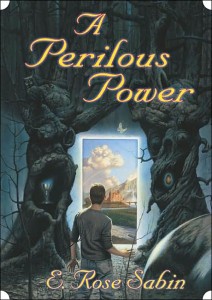
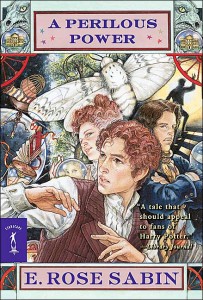 Trevor Blake possesses magical gifts like few others in his home village. Because of his abilities to move things with his mind, communicate over long distances, and conjure items, he’s distrusted and feared, forbidden to use his powers by his parents, able to train only in secret. His best friend Les has a great untapped, unidentified power, and shares a bond with Trevor. Together, they set off on a grand adventure, traveling to the city of Port-Of-Lords in their native country of Arucadi. Armed with some money, and letters of introduction, they hope to gain admittance to the Community, a group of people with supernatural powers like themselves. Unfortunately, disaster strikes almost immediately after arriving, leaving them destitute and jailed. Even after Veronica, a former member of the Community, saves them, their troubles are nowhere near over. A cunning, ruthless con man has plans for Trevor and Les, and he’ll bleed them dry of their power and identities if need be. Worse still, one of the Community has embarked upon a terrifying scheme to gain control of all the power available, and no one is safe. It’s up to Trevor, Les, Veronica, and a troubled young woman named Miryam to foil the multiple plots and save the Community, and themselves. The only problem is, it may take the ultimate sacrifice.
Trevor Blake possesses magical gifts like few others in his home village. Because of his abilities to move things with his mind, communicate over long distances, and conjure items, he’s distrusted and feared, forbidden to use his powers by his parents, able to train only in secret. His best friend Les has a great untapped, unidentified power, and shares a bond with Trevor. Together, they set off on a grand adventure, traveling to the city of Port-Of-Lords in their native country of Arucadi. Armed with some money, and letters of introduction, they hope to gain admittance to the Community, a group of people with supernatural powers like themselves. Unfortunately, disaster strikes almost immediately after arriving, leaving them destitute and jailed. Even after Veronica, a former member of the Community, saves them, their troubles are nowhere near over. A cunning, ruthless con man has plans for Trevor and Les, and he’ll bleed them dry of their power and identities if need be. Worse still, one of the Community has embarked upon a terrifying scheme to gain control of all the power available, and no one is safe. It’s up to Trevor, Les, Veronica, and a troubled young woman named Miryam to foil the multiple plots and save the Community, and themselves. The only problem is, it may take the ultimate sacrifice.
A Perilous Power is actually a prequel to Sabin’s first book, A School for Sorcery, though it isn’t obvious at first, save to sharp-eyed readers. Fast-paced, once the action and intrigue start, they don’t let up, taking the characters and the readers on a wild ride through a world struggling to reconcile the co-existence of technology and magic around the time of the Industrial Revolution. Though I often wanted to shake Trevor for being an idiot, his foolhardiness is sadly true to the character, making the losses he suffers all the more important in the long run. If Rowling collaborated with Dickens, they might produce something akin to A Perilous Power. I really enjoyed it, and I look forward to Sabin’s next work.
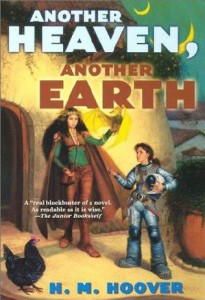 It’s culture clash and culture shock, as two worlds collide in this Starscape reprint of Hoover’s 1981 book. It’s the far future, and mankind has taken to the stars. The spaceship Kekule is on a mission of exploration, seeking out new worlds for potential colonization. Xilan seems suitable, if not entirely perfect. One catch: We’ve already been there. The descendants of a centuries-ago colonization attempt struggle to eke out an existence, having forgotten their origins and almost everything of what they associate of the Founders. Only a few, such as Gareth Mitchell, care about the past or have the ability to accept the things to come. History’s about to repeat itself, as the newcomers from Earth bring change, disruption, disease, and their own ways with them, ways which threaten to destroy what the people of Xilan have built for themselves.
It’s culture clash and culture shock, as two worlds collide in this Starscape reprint of Hoover’s 1981 book. It’s the far future, and mankind has taken to the stars. The spaceship Kekule is on a mission of exploration, seeking out new worlds for potential colonization. Xilan seems suitable, if not entirely perfect. One catch: We’ve already been there. The descendants of a centuries-ago colonization attempt struggle to eke out an existence, having forgotten their origins and almost everything of what they associate of the Founders. Only a few, such as Gareth Mitchell, care about the past or have the ability to accept the things to come. History’s about to repeat itself, as the newcomers from Earth bring change, disruption, disease, and their own ways with them, ways which threaten to destroy what the people of Xilan have built for themselves.
Only a few people, such as biologist Lee Hamlin, are willing to defy orders and try to preserve a way of life so different from what the shipbound humans know.
The strengths of Another Heaven, Another Earth, lie in the skillful way Hoover describes the meeting of two cultures, both in results and in attitudes. Both sides see each other as aliens first, fellow humans later, and not before significant damage has been done. Gareth and Lee are both likeable, able to hold to their principles even when it costs them personally. The plot is classic Old meets New, echoing of Europe finding the New World, and the message still rings true: we have to be careful when we meet our neighbors for the first time, lest things go awry, and we should respect their ways too. All in all, a good solid read, and another fine reprint from Starscape’s growing library.

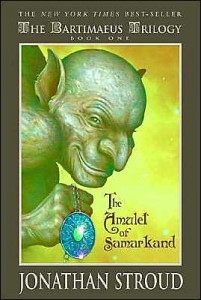 Taking place in an alternate London where magicians rule through the power of the spirits they summon from beyond, one young man’s desire for revenge entangles him in the heart of a conspiracy aimed at the highest levels of power. Still a year away from gaining his official magician’s name and being granted a measure of respect, the eleven year old apprentice known as Nathaniel secretly summons an ancient, powerful djinn, Bartimaeus, and commands his newfound servant to steal the fabled Amulet of Samarkand from the magician who wronged him, Simon Lovelace.
Taking place in an alternate London where magicians rule through the power of the spirits they summon from beyond, one young man’s desire for revenge entangles him in the heart of a conspiracy aimed at the highest levels of power. Still a year away from gaining his official magician’s name and being granted a measure of respect, the eleven year old apprentice known as Nathaniel secretly summons an ancient, powerful djinn, Bartimaeus, and commands his newfound servant to steal the fabled Amulet of Samarkand from the magician who wronged him, Simon Lovelace.
What Nathaniel doesn’t realize is just how ruthless Lovelace is, or how importantly the Amulet factors into a diabolical scheme. Even with the unwilling aid of Bartimaeus, Nathaniel will be tested to the very limits of his loyalty, resourcefulness, and magical abilities. If the odd pair fail, they, and the rest of London’s power structure, will be in for a horrible end indeed.
If I had to label one book as “If you like Harry Potter, you’ll like this,” it would definitely be The Amulet of Samarkand. The first book in the Bartimaeus Trilogy, it’s nevertheless structured so that it tells a full story in its own right, leaving just enough loose ends to set up the remainder of the series. Nathaniel and Bartimaeus are the unlikeliest of allies, with only threats and mutual bonds of need keeping them together during the darkest times. One of the most entertaining aspects of this book is that half of it is told from Bartimaeus’ viewpoint. Not only is he snarky, over-confident, self-involved and egotistical, he speaks in footnotes, which serve to explain many of the unusual aspects of his world and personal history. The other half of the book focuses on Nathaniel, but even during those times, we never lose track of the fact that this is Bartimaeus’ story. I’m eagerly awaiting the next installment of the trilogy.
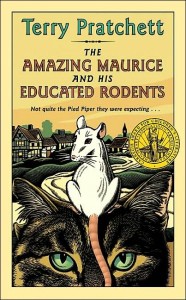 If anyone can take the common themes of a story and turn them inside out, it’s Terry Pratchett, best known for his long-running Discworld series. In this book, he takes the classic Pied Piper story, and takes it where it’s never gone before: into the mind of the rats. Imagine, if you will, that not only are the rats and the piper in cahoots, but the true brains of the operation is a talking cat, most assuredly not Puss in Boots. These rats are smart and cunning, capable of talking, using tools, recognizing poisons and disarming traps, and dreaming for a better future. The piper’s just a kid along for the chance to play his music. And Maurice, the cat, is having a severe identity crisis regarding proper catlike behavior versus loyalty to his companions. They’ve got a great scam going, working it from town to town, collecting the reward and moving on before anyone catches on. Then they come to the town of Bad Blintz, and everything’s thrown into disarray. All the normal rats are missing, yet local rat-catchers do a hefty business. Something dark and disturbing, born of hatred and fear and mistreatment, capable of controlling minds, dwells under the city. It’s up to Maurice, the piper, the rats (who think of themselves as Changelings, made that way after eating some wizardly rubbish – now ask yourself how the cat Changed…), and their new friend, Malicia Grim (whose grandmother and great-aunt were the noted authors, the Sisters Grim, giving Malicia quite the insight into fairy tales) to unravel the mystery before it devours them all. If they succeed, it’s easy street for everyone. If they fail, they’ll find out what form Death takes for rats. (Hint: SQUEAK, for you Discworld fans).
If anyone can take the common themes of a story and turn them inside out, it’s Terry Pratchett, best known for his long-running Discworld series. In this book, he takes the classic Pied Piper story, and takes it where it’s never gone before: into the mind of the rats. Imagine, if you will, that not only are the rats and the piper in cahoots, but the true brains of the operation is a talking cat, most assuredly not Puss in Boots. These rats are smart and cunning, capable of talking, using tools, recognizing poisons and disarming traps, and dreaming for a better future. The piper’s just a kid along for the chance to play his music. And Maurice, the cat, is having a severe identity crisis regarding proper catlike behavior versus loyalty to his companions. They’ve got a great scam going, working it from town to town, collecting the reward and moving on before anyone catches on. Then they come to the town of Bad Blintz, and everything’s thrown into disarray. All the normal rats are missing, yet local rat-catchers do a hefty business. Something dark and disturbing, born of hatred and fear and mistreatment, capable of controlling minds, dwells under the city. It’s up to Maurice, the piper, the rats (who think of themselves as Changelings, made that way after eating some wizardly rubbish – now ask yourself how the cat Changed…), and their new friend, Malicia Grim (whose grandmother and great-aunt were the noted authors, the Sisters Grim, giving Malicia quite the insight into fairy tales) to unravel the mystery before it devours them all. If they succeed, it’s easy street for everyone. If they fail, they’ll find out what form Death takes for rats. (Hint: SQUEAK, for you Discworld fans).
This is a brilliant, thoroughly enjoyable take on an old story, possessing all of Pratchett’s usual humor and remarkable sophistication not only for the Discworld books (in my previous experience) but for young adult books in general. It never loses sight of the material it’s inspired by, and manages to incorporate a metatextual thread without completely losing all credibility. I was sucked in by the narrative, and quite pleased overall by the end results. Pratchett’s in fine form, as sly and clever and wickedly self-aware as ever. The Amazing Maurice and His Educated Rodents is worth looking at.
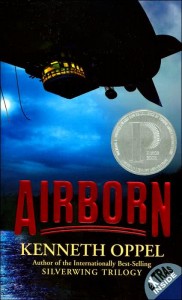 Welcome to a world where the discovery of a special natural gas allows airships to ply their trade across the skies, facilitating trade and travel in an elegant, classic manner. Among these magnificent airships is the Aurora, a huge vessel catering to wealthy passengers and exotic cargo. Aboard the Aurora is young Matt Cruse, a cabin boy who dreams of someday captaining the Aurora, if not another airship of her caliber. However, he has a long way to go before that day. In the meantime, he does his best to fulfill the myriad duties of his station, occasionally going above and beyond the call of duty as needed. When he rescues a dying balloonist, he unknowingly opens the door to greater adventure, for the balloonist’s diary hints at strange creatures dwelling in the clouds.
Welcome to a world where the discovery of a special natural gas allows airships to ply their trade across the skies, facilitating trade and travel in an elegant, classic manner. Among these magnificent airships is the Aurora, a huge vessel catering to wealthy passengers and exotic cargo. Aboard the Aurora is young Matt Cruse, a cabin boy who dreams of someday captaining the Aurora, if not another airship of her caliber. However, he has a long way to go before that day. In the meantime, he does his best to fulfill the myriad duties of his station, occasionally going above and beyond the call of duty as needed. When he rescues a dying balloonist, he unknowingly opens the door to greater adventure, for the balloonist’s diary hints at strange creatures dwelling in the clouds.
Later, when the man’s granddaughter takes passage on the Aurora, she enlists Matt’s help in trying to prove her grandfather wasn’t sick or mad, but indeed did discover something no one else had ever seen. However, they’re soon sidetracked when vicious air pirates brazenly attack the Aurora, causing the airship to crash on a deserted island, whose secrets may be worth killing for. It’s action and adventure over the sea, through the jungles, and in the air, as Matt and Kate dodge pirates and unknown creatures and other threats. Combining the very best of Jules Verne and Robert Louis Stevenson, Airborn manages to capture the very essence of “retro-cool.” After all, what science fiction fan doesn’t have a soft spot for pirates, airships, or both? Not only is it classic, it’s classy. This is a book just begging for a sequel.
 I’ve been hyping this book to everyone I can, and the best way I’ve found to describe it “The Secret Garden meets The Craft,” or “Little Princess meets Little Witches.” Don’t think I’m trying to pigeonhole this beautifully fascinating book; it’s a lot more than it seems. Set in 1895, it manages to capture a number of Victorian themes: the double standard of sexuality, a fascination with the occult, gender expectations, and an era of colonial globalization. And yet boiling it down like that does the book an injustice.
I’ve been hyping this book to everyone I can, and the best way I’ve found to describe it “The Secret Garden meets The Craft,” or “Little Princess meets Little Witches.” Don’t think I’m trying to pigeonhole this beautifully fascinating book; it’s a lot more than it seems. Set in 1895, it manages to capture a number of Victorian themes: the double standard of sexuality, a fascination with the occult, gender expectations, and an era of colonial globalization. And yet boiling it down like that does the book an injustice.
Sixteen-year-old Gemma Doyle has lived her entire life with her family in India, but she yearns for the sophistication and civilization of London. When her mother is tragically killed in what Gemma knows to be anything but a random murder, Gemma is sent to England to finish her education at the Spence Academy. There, she makes new friends, and new enemies, the matter complicated by her growing magical abilities and the mysteries surrounding her family’s past. As Gemma recruits several other young ladies to explore the occult, they become entangled in a decades-old tragedy, and in the workings of a group of magic-wielding females once called the Order. However, what they don’t realize is that they’re drawing the attention of powers beyond their comprehension, dangerous powers that could destroy them all. Is the potential for beauty, for power, for enlightenment, for love, and for reuniting with lost relatives worth the risk? Gemma and her companions may not learn until it’s too late. And what parts do an old diary, and a band of Gypsies have to play? All will be told, eventually.
A Great and Terrible Beauty is gorgeous, sensual in places and terrifying in others, an impressive debut from newcomer Libba Bray. It captures a group of young ladies during a turmoil-filled period of their lives, caught on the brink of womanhood, in an era likewise undergoing a transition, and continually manages to surprise. I’m looking forward to Bray’s next offering. A special mention should also be given to the eye-catching cover by Trish Watts and Michael Frost.
 In the mood for something a bit more light and fluffy? You can’t go too wrong with this offering from Dorchester Publishing’s new “Smooch” line of teen romances. It practices truth in advertising: the title pretty much gives away the premise. You have Traci Nettleton, nice normal everyday teenage girl. Then you have the handsome quarterback Brad Davidson, her current object of lust, who, happily, likes her back. There’s only one thing that can stand between them. Corky, Traci’s former best friend, who’s been dead for two years, only to return as a ghost, capable of sending e-mail messages and pulling pranks on the living. His timing leaves something to be desired. It’s going to be hard for Traci and Brad to form a relationship when a jealous ghost is on the loose. Throw in all the usual distractions (such as Traci and Brad’s feuding single parents) and you have a teen romance with a supernatural twist. There aren’t too many surprises to be found here; by its very nature, it’s somewhat formulaic. However, it’s a nice change of pace from books with Meaning and Relevance, and sometimes you just need a feel-good book. Keep your expectations low, and you’ll be pleasantly surprised.
In the mood for something a bit more light and fluffy? You can’t go too wrong with this offering from Dorchester Publishing’s new “Smooch” line of teen romances. It practices truth in advertising: the title pretty much gives away the premise. You have Traci Nettleton, nice normal everyday teenage girl. Then you have the handsome quarterback Brad Davidson, her current object of lust, who, happily, likes her back. There’s only one thing that can stand between them. Corky, Traci’s former best friend, who’s been dead for two years, only to return as a ghost, capable of sending e-mail messages and pulling pranks on the living. His timing leaves something to be desired. It’s going to be hard for Traci and Brad to form a relationship when a jealous ghost is on the loose. Throw in all the usual distractions (such as Traci and Brad’s feuding single parents) and you have a teen romance with a supernatural twist. There aren’t too many surprises to be found here; by its very nature, it’s somewhat formulaic. However, it’s a nice change of pace from books with Meaning and Relevance, and sometimes you just need a feel-good book. Keep your expectations low, and you’ll be pleasantly surprised.
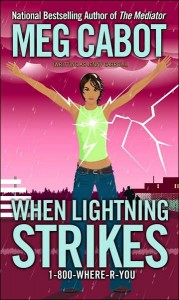
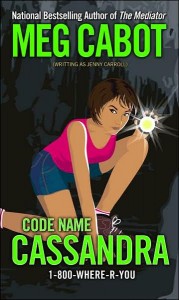 Most people, when struck by lightning, end up in the hospital. Sixteen-year-old Jessica Mastriani, however, is granted a bizarre psychic ability as the result of her unfortunate accident. Now, when she sleeps, she finds missing people in her dreams, waking up with their location and sometimes their condition firmly planted in her consciousness. It all started with knowing just where the kid on the back of a milk carton was, years after he’d been kidnapped by his own mother after a custody dispute. Jess did the only proper thing: she called 1-800-WHERE-R-YOU, a national hotline dedicated to tracking down missing people and helping to return them to their proper homes. The first time was a success. The second, a statistical fluke. But four successful calls later, Jess discovered a new problem: the government had a very keen interest in her, and a use for her powers. Once she realized what they had in mind, turning her into a human bloodhound for escaped criminals, terrorists, and that ilk, she went on the run, combining her flight to freedom with an effort to rectify an earlier mistake. Little did she realize that was just the beginning of her adventures.
Most people, when struck by lightning, end up in the hospital. Sixteen-year-old Jessica Mastriani, however, is granted a bizarre psychic ability as the result of her unfortunate accident. Now, when she sleeps, she finds missing people in her dreams, waking up with their location and sometimes their condition firmly planted in her consciousness. It all started with knowing just where the kid on the back of a milk carton was, years after he’d been kidnapped by his own mother after a custody dispute. Jess did the only proper thing: she called 1-800-WHERE-R-YOU, a national hotline dedicated to tracking down missing people and helping to return them to their proper homes. The first time was a success. The second, a statistical fluke. But four successful calls later, Jess discovered a new problem: the government had a very keen interest in her, and a use for her powers. Once she realized what they had in mind, turning her into a human bloodhound for escaped criminals, terrorists, and that ilk, she went on the run, combining her flight to freedom with an effort to rectify an earlier mistake. Little did she realize that was just the beginning of her adventures.
After the events of When Lightning Strikes, everyone supposedly believes Jess has lost her powers. At least, that’s when she wants them to believe. Unfortunately, the FBI’s still watching her closely, and people still come to her for help whether she wants them to or not. Even going away to work as a counselor at a summer camp for musically gifted children can’t let her escape from her newfound notoriety. Finally, someone makes a case she can’t refuse, and Jess, AKA “Lightning Girl” is on the job, this time trying to rescue a missing girl from an unsuitable mother and a psychopathic stepfather. And all Jess really wants is to be left alone. Oh, and for rebellious, all-too-hunky Rob Wilkins to give in to that passion she knows he’s hiding for her… Can Jess survive long enough to get kissed? That’s what she has to look forward to in Code Name Cassandra.
Then Jess returns home after spending the summer away, only to learn that in her absence, one of the most popular girls in school was murderer, and she’s blamed for not doing anything to stop it. Never mind she was nowhere near. Forget that she’s not supposed to have her powers anyway. The high school mentality is a fickle one. But then another cheerleader is kidnapped, and Jess can’t stand by, even if her two favorite FBI agents, Smith and Johnson, are hot on her trail. And what’s she to do when a handsome football star starts hitting on her? The stakes are higher than ever, especially when someone resorts to arson to try and scare her off the trail. In Safe House, the dangers hit close to home.
In Sanctuary, events heat up all the more, after racial tensions and cult killings bring Jess’s small town home to a boiling point, with all signs pointing to a nasty militia group as the culprits. After one young man is murdered, and another kidnapped, Jess has no choice but to ally herself with the FBI if she wants to save an innocent life and stop the militia group from hurting anyone else. Luckily, though she doesn’t trust the FBI one bit, she still has her would-be boyfriend Rob, and the calvary (in the form of a group of truckers and rednecks) at her back.
What can I say? Meg Cabot’s books are a guilty pleasure. The 1-800-WHERE-R-YOU series is genuinely fun, and a little addictive. The point of view character is pure teenager, with a down to earth way of expressing herself, and a very dry sense of humor that bleeds through into her internal commentary, leading to a rather relaxed, flowing sort of story. Jess is really likable: headstrong, independent, stubborn, prone to hitting people who annoy her (that includes FBI agents, by the way), hopelessly in lust with a boy two years older than herself, and determined to do the right thing, no matter how stupid it seems at the time. She’s surrounded by memorable characters: her restauranteur father, her long-suffering stay-at-home mother, her schizophrenic brother Douglas, her other brother Michael (who’s still harboring a crush on the girl next door, the one who sunbathes every day in summer, in public), her faithful-yet-exasperated best friend Ruth, and the mismatched FBI agents Smith and Johnson. There’s also Rob, a former juvenile delinquent still on probation (for what he won’t say), who seemingly has no defense against Jess; persistent ways. Add them all together, and you have a series with a distinctive voice. Honestly, I didn’t think I’d like this series at a first glance, but once I started, I couldn’t stop reading until I’d polished off all four books. And if you like these books, I also recommend Cabot’s Mediator series, which I may cover in a later column. My only real complaint is that the titles really don’t seem to match the plots, save for When Lightning Strikes. It almost feels as though the names were drawn from a hat after the book was already written. A small quibble, though, and it shouldn’t discourage you from checking them out.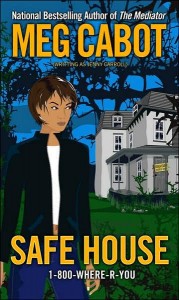

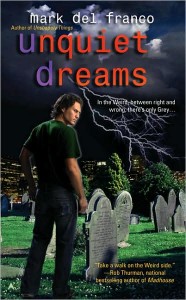
 Once upon a time, Connor Grey was a hotshot member of the Ward Guild, a druid on the fast track to importance and power. That is, until a traumatic encounter with an ecoterrorist elf left him crippled magically and forced him to strike out on his own as a private investigator. Now he handles cases involving the fey where neither the Guild nor the Boston Police Department are able, or willing, to get involved. It’s dirty, nasty, occasionally discouraging work, and a far cry from the stuff he used to handle, but for Grey, it’s a way to stay involved. And maybe someday, he’ll get his powers back, and finally be allowed to get revenge upon the elf who caused it all. But in a world where elves and fairies, druids and dwarves, coexist alongside normal humanity, there’s always something that needs his attention.
Once upon a time, Connor Grey was a hotshot member of the Ward Guild, a druid on the fast track to importance and power. That is, until a traumatic encounter with an ecoterrorist elf left him crippled magically and forced him to strike out on his own as a private investigator. Now he handles cases involving the fey where neither the Guild nor the Boston Police Department are able, or willing, to get involved. It’s dirty, nasty, occasionally discouraging work, and a far cry from the stuff he used to handle, but for Grey, it’s a way to stay involved. And maybe someday, he’ll get his powers back, and finally be allowed to get revenge upon the elf who caused it all. But in a world where elves and fairies, druids and dwarves, coexist alongside normal humanity, there’s always something that needs his attention.
First up is a string of murders involving fairy prostitutes in the Weird, the Boston neighborhood where the desperate and lonely, discarded and secretive, all dwell. Naturally, there’s a lot more to these killings than meets the eye, especially when Connor discovers that there might be some sort of ritual involved. To crack this case, Connor will have to work with a variety of friends and allies, from the human cop Murdock, to the tiny flit Joe, to his old coworker Keeva, to the intimidating Briallen. The further they dig, the more they uncover, the killings linked to one of a handful of rare magical crossbreeds. Ultimately, Connor’s quest for justice brings him into a final, messy confrontation with a madman who might very well destroy the world in his attempt to claim both power and revenge. If Connor’s resolve fails now, no one will be safe.
Obviously, Connor doesn’t die, and the world doesn’t end, as some time after he recovers from that mess, he’s again called into the Weird. This time, a human gangbanger and a prominent elf diplomat have died, in separate yet equally ugly fashion, and what looks like two unrelated killings at first is soon proven to be the tip of a horrible problem indeed. Connor’s on the case, no matter what some people would say, and he’s not about to give up yet. People are dead, trouble is brewing, and he’s determined to solve the case. But as he digs deep, the Teutonic elves and Celtic fairies come closer to outright war in the streets, their rivalry fueled by drugs, territorial squabbles, and ancient rivalries. Connor will again have to mobilize his closest allies, including the alluring, mercurial Meryl, as he tries to keep the conflict from destroying the Guild and the Weird as it escalates beyond control. But who’s behind it all, and how are they connected to Connor and his allies? That’s what Connor would like to know.
Mark del Franco has really created a fascinating world for this series. Four races of supernatural beings, roughly split into two different ethnic factions, came to Earth in an event known as the Convergence, and things have been complicated ever since, resulting in plenty of tension, political infighting, intrigue, and outright messiness at times. Into this, we have our hero, Connor Grey, who’s as classic a hardboiled P.I. as one can hope for, a man broken by his past and down on his luck, but noble and strong-willed and too stubborn to ever know when to quit. He’s surrounded by a host of equally interesting characters, including Murdock, who’s as close a friend as Connor comes to in the mortal world, and Joe, who’s as much a pest as he is a secret resource. Connor’s interactions with Keeva, who acts as both ally and enemy, and Meryl, who’s both love interest and occasional foil for his ego, likewise fuel plenty of entertaining scenes.
The plots move quickly, with a good number of twists and turns, and the mysteries at the heart of the story are genuinely intriguing. I just couldn’t stop reading, eager to learn just how everything wraps up and who did what to whom and why. There’s a lot to this setting, and plenty of back-story left to be uncovered, and I can hardly wait to see just what del Franco has in store for his heroes in future installments. This is definitely urban fantasy with its own identity, hardboiled mystery with action and politics and intrigue all worked into the plot, and it’s a lot of fun. Give this a shot if you’re afan of Jim Butcher, Mike Carey, or even Simon Green’s Nightside series.
